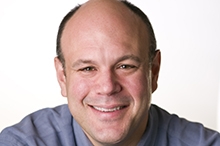Diabetes Innovation Can Come from Anywhere

Tidepool is honored to be a part of the Champions of Change for Precision Medicine initiative. Tidepool is part of the larger #WeAreNotWaiting movement, a Twitter hashtag symbolizing the powerful notion that patients should own their own health and therapy data and that innovation can emanate from anywhere. Engaged patients armed with data can be active participants in their own care, leading to innovative solutions and healthier outcomes on a timescale much faster than traditional medical device development.
My personal story began when my daughter Katie was diagnosed with Type 1 Diabetes (T1D) in 2011. Prior to that, I knew nothing about diabetes. I didn’t know that there were different kinds of diabetes or what the day-to-day treatment meant. Type 1 Diabetes is an autoimmune disease that causes the pancreas to stop producing insulin, a hormone necessary to metabolize food and absorb energy. I certainly didn’t know how burdensome T1D is to manage nor how high the stakes are for getting it right. People with T1D face both the daily risk of a seizure, coma or death from low blood sugars (hypoglycemia) caused by taking too much insulin, and also long-term risks of nerve damage and organ failure due to high blood sugars (hyperglycemia). To make managing T1D even more challenging, exercise, sickness, stress, menstrual cycles and many other factors also affect how your body will react to insulin.
With the stakes so high you might think that there would be a vibrant ecosystem of applications to help people manage T1D. Unfortunately, until very recently, most diabetes devices like insulin pumps, continuous glucose monitors and blood glucose meters came with their own hard-to-use proprietary software. Fortunately, as Tidepool and the #WeAreNotWaiting movement have gained momentum, this has changed. Most diabetes device companies now embrace the notion that patients own their own data and that patients should be able to use whatever software they want to access it.
At first, the prospect of delivering regulated medical software seemed daunting to us. Fortunately, we received great advice to engage early and often with the FDA, which we’ve done. By being transparent about our activities and involving the FDA as our software has evolved, we’ve found the team at CDRH to be completely pragmatic, encouraging and supportive. Like our software, we’ve chosen to make our regulatory quality system freely available, which we hope will help other healthcare startups.
Tidepool chooses to be a non-profit because it is the best way to make it clear to patients and industry that our efforts are not about building a business or monetizing patient data. Instead, our goal is to give away our software – we are a free and open source software project – and to enable an ecosystem of application development and diabetes research.
Tidepool is one of many projects that have embraced the notion that empowered patients and parents with access to diabetes data and device protocols can make a profound difference. The NightScout project and “CGM in the Cloud” community have enabled remote monitoring of loved ones’ blood sugars. OpenAPS, Bigfoot Biomedical and others have done work that enables automated delivery of insulin. Like Tidepool, these projects all began as do-it-yourself projects by engaged parents and patients, all making it clear that the T1D community will not stand idly by waiting for innovation to occur. Innovation in healthcare is as likely to come from a garage or home office as it is from the labs of a large device company.
Howard Look is the Founder and CEO of Tidepool, a non-profit, open source effort dedicated to reducing the burden of managing Type 1 Diabetes. His teenage daughter has T1D.
White House Blogs
- The White House Blog
- Middle Class Task Force
- Council of Economic Advisers
- Council on Environmental Quality
- Council on Women and Girls
- Office of Intergovernmental Affairs
- Office of Management and Budget
- Office of Public Engagement
- Office of Science & Tech Policy
- Office of Urban Affairs
- Open Government
- Faith and Neighborhood Partnerships
- Social Innovation and Civic Participation
- US Trade Representative
- Office National Drug Control Policy
categories
- AIDS Policy
- Alaska
- Blueprint for an America Built to Last
- Budget
- Civil Rights
- Defense
- Disabilities
- Economy
- Education
- Energy and Environment
- Equal Pay
- Ethics
- Faith Based
- Fiscal Responsibility
- Foreign Policy
- Grab Bag
- Health Care
- Homeland Security
- Immigration
- Innovation Fellows
- Inside the White House
- Middle Class Security
- Open Government
- Poverty
- Rural
- Seniors and Social Security
- Service
- Social Innovation
- State of the Union
- Taxes
- Technology
- Urban Policy
- Veterans
- Violence Prevention
- White House Internships
- Women
- Working Families
- Additional Issues

